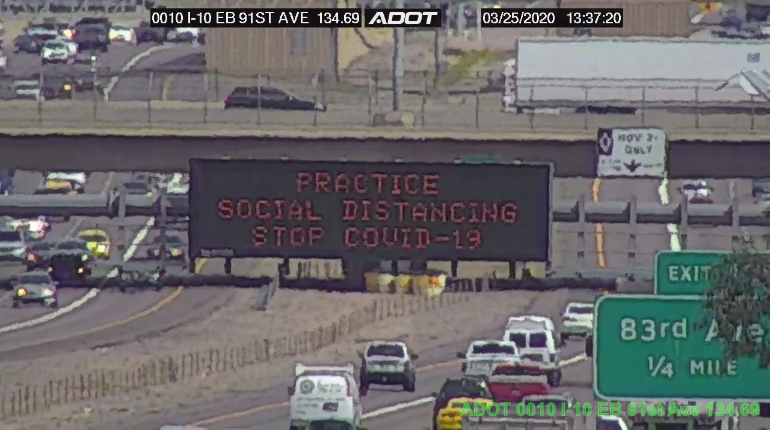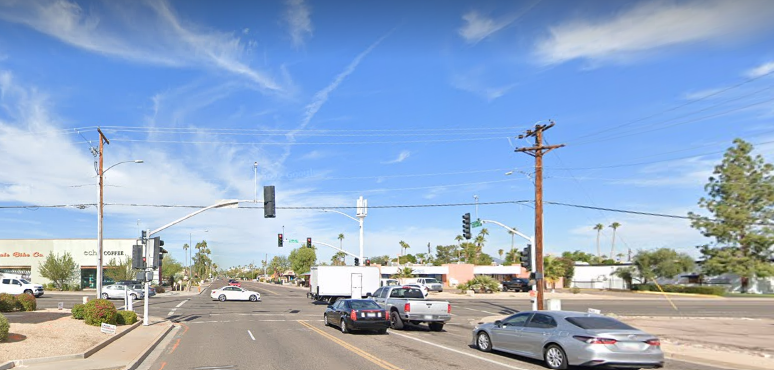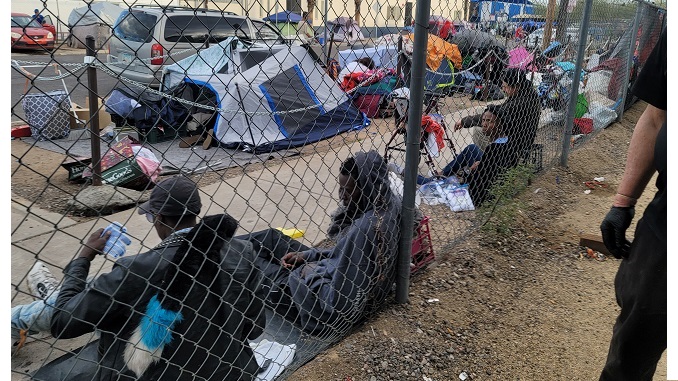
by Corinne Murdock | Mar 27, 2023 | Education, News
By Corinne Murdock |
Arizona State University (ASU) held a Department of Justice (DOJ) “United Against Hate” event for the LGBTQ+ community last Wednesday.
The event was the second in a series from the Arizona District Attorney’s Office, hosted by ASU’s Sandra Day O’Connor College of Law. There were approximately 80 guests invited, including representatives from the FBI, the Phoenix Police Department, the Maricopa County Attorney’s Office, and the Attorney General’s office.
District attorney Gary Restaino said that his office was not only committed to prosecuting hate crimes and discrimination, but tackling ignorance and bias.
“Hate crimes harm not just individuals, but also traumatize communities and families,” said Restaino. “My office is committed to using all the tools in our law enforcement arsenal, both to prosecute acts motivated by hate, and to educate against ignorance and bias.”
UAH events are part of the DOJ’s national United Against Hate program, which coordinates all 94 U.S. Attorney’s Offices (USAOs) to combat hate crimes. The DOJ announced the initiative last September. According to the initial press release description of the program, UAH events resemble workplace harassment training: hypothetical scenarios and video clips depicting real-life hate crime cases and stories.
Attorney General Merrick Garland explained that the UAH program was designed to strengthen coordination between the community and law enforcement to respond to hate crimes and discrimination.
“That is why the Justice Department has launched its new United Against Hate program. This initiative brings together community groups, community leaders, and law enforcement at every level to build trust and strengthen coordination to combat unlawful acts of hate,” said Garland.
Assistant Attorney General Kristen Clarke added that this greater coordination would ensure that more allegations of hate crimes and discrimination would be investigated.
“The stronger the ties between communities and law enforcement, the more faith that communities will have that their allegations will be investigated and taken seriously. This moment requires an all-hands-on-deck strategy to fully confront unlawful acts of hate,” said Clarke. “The United Against Hate program brings together the vast network of civil rights, government, faith, and community-based leaders needed to improve reporting, promote prevention strategies and build the resilience needed to confront hate crimes and incidents.”
Garland first revealed the intent to launch the UAH initiative in May 2021, following President Joe Biden signing the COVID-19 Hate Crimes Act and Jabara-Heyer NO HATE Act into law. The act prioritizes funding for states who implement a hate crimes investigatory infrastructure in accordance with the legislation, part of which includes a community liaison and public meetings or educational forums on the impact of hate crimes, services available to hate crime victims, and the laws regarding hate crimes.
The act also moved that those sentenced to supervised release following imprisonment for a hate crime may be required to undergo educational classes or community service related to their offense.
Three USAOs piloted the program in spring 2021: New Jersey, Massachusetts, and the Eastern District of Washington. There have been over 50 events held nationwide since then.
The first UAH event in Arizona occurred in December, at the First Institutional Baptist Church in Phoenix. The event focused on combating hate crimes and discrimination against African-Americans. The Arizona District Attorney’s Office plans on hosting more UAH events in the coming months.
Corinne Murdock is a reporter for AZ Free News. Follow her latest on Twitter, or email tips to corinne@azfreenews.com.

by Daniel Stefanski | Mar 26, 2023 | News
By Daniel Stefanski |
A bill to limit a certain government agency’s arsenal of communications is advancing through the Arizona Legislature, though it became a tough sell for Democrats on the House floor after earlier bipartisan votes in committees.
HB 2586, sponsored by Representative Neal Carter, “restricts the Arizona Department of Transportation’s (ADOT) dynamic message signs (DMSs) to display only messages that are directly related to transportation or highway public safety and outlines exceptions,” according to the purpose provided by the State Senate.
During his testimony to the House Transportation & Infrastructure Committee, the bill sponsor, Representative Carter, explained that “this bill is the law in other states.” His reasons for introducing the bill were that some of the ADOT freeway signs are a “little bit distracting” because there are messages that may not be related to transportation and otherwise inappropriate to share with commuters; and that there was good cause to worry “about government effectively using it as an advertisement for other things.” He told the committee that this would be worrying “because the people making those decisions should be elected people,” and it would be a “slippery slope” to have bureaucrats at ADOT deciding what to market or message.
When questioned about the legislation by the committee chairman, Representative David Cook, Carter clarified that it would not be the intent of HB 2586 to “specify how to make the messaging” – for example, limiting the creativity of the content as long as it was directly related to transportation. Representative Carter’s chief concern was signs that aren’t communicating directly about transportation – like “No Burn Days.”
Chairman Cook and Carter both agreed that ADOT messaging about vaccines would be a good example of what should not be included on the signs for passersby.
Representative Carter amended his bill to allow “the Arizona Department of Transportation to display reminders to vote on dynamic message signs.”
The bill passed out of the House Transportation & Infrastructure Committee with a 7-4 vote, with one member absent from the final deliberation. One Democrat voted in support. The Rules Committee unanimously approved the legislation with an 8-0 tally.
On the House floor, Democrat Representative Cesar Aguilar highlighted his opposition to the bill, arguing that the policy “would impact Arizona’s culture of signs we see on the road,” noting his perception that the ADOT “Don’t Drink and Drive” signs would be banned should this legislation be signed into law. Carter rejected that assertion, saying that the aforementioned signs were transportation-related and would not be subjected to the updated regulations of his bill. Carter also touted the bipartisan support for the bill during the committee process. Unlike in committees, though, HB 2586 did not receive any support from Democrats on the House floor, passing 31-28 – with one Democrat member not voting.
HB 2586 was transmitted to the Senate and was approved by the Transportation and Technology Committee earlier this month with a party-line 4-3 vote. It awaits further action from that legislative body.
Daniel Stefanski is a reporter for AZ Free News. You can send him news tips using this link.

by Corinne Murdock | Mar 26, 2023 | News
By Corinne Murdock |
Scottsdale will halve the number of lanes on a major roadway, a “road diet” that effectively burdens car travel. The changes will occur to 68th Street between Indian School Road and Thomas Road, and will reduce the two-lane roads on either side into single lanes.
According to the Department of Transportation (DOT), a “road diet” occurs when a four-lane undivided roadway becomes a two-lane undivided roadway, with the former road lanes converted into alternative transportation lanes: bike lanes or pedestrian refuge islands, for example.
DOT noted that road diets are typically implemented on roadways with current and future average daily traffic of 25,000 or less. According to the city data last updated in 2020, the average daily traffic counts for that area were 38,000 at the crossroads of 68th Street and Thomas Road, and 46,100 at 68th Street and Indian School Road. That number is undoubtedly higher now based on the latest population data.
According to census estimates, Scottsdale is growing at a rate of about one percent annually, and has grown by nearly three percent since the 2020 census. According to the U.S. Census annual state population estimates released last December, the state was the fifth-fastest growing state in the nation; Maricopa County leads in those gains.
The city approved the changes during its council meeting last week in a close vote, 4-3. The two lost lanes will be turned into bike lanes using a .2 percent transportation sales tax funding, costing just over $334,600. The city will also receive over $1.48 million in federal funding awarding environmentalist development: “Congestion Mitigation Air Quality” and “Transportation Alternatives” funds.
With federal and local funds combined, current funding sources for the project total $1.8 million. Proposed funding for the project total over $1.9 million.
Councilmember Barry Graham lamented his fellow council members’ decision.
“I tried to find a compromise that preserved the car lanes,” tweeted Graham. “Unfortunately, councilmembers made the issue about what they want—not what you want.”
Vice Mayor Kathy Littlefield and Councilmembers Betty Janik joined Graham in his “no” vote.
State Rep. Joseph Chaplik (R-LD03) criticized Scottsdale for adopting a “road diet.”
Chaplik also testified that he bore witness to similar initiatives taking place in Portland, Oregon, before that city “imploded.”
The reduction of car lanes to disincentivize car use echoes similar “Vision Zero” efforts — an attempt to eliminate all traffic fatalities by restructuring roads in ways that, ultimately, diminish the number of cars on the road. Vision Zero is a fiscally sponsored project of Community Initiatives, a grantmaking institution whose funding comes from a variety of left-leaning nonprofits such as the Grove Foundation, Rockefeller Brothers Fund, and the NoVo Foundation.
Scottsdale’s major neighbor, Phoenix, adopted a Vision Zero plan of their own.
Last September, the city of Phoenix decided to spend $10 million every year until they achieve zero traffic-related fatalities, as per their Vision Zero Road Safety Action Plan (RSAP).
Corinne Murdock is a reporter for AZ Free News. Follow her latest on Twitter, or email tips to corinne@azfreenews.com.

by Corinne Murdock | Mar 25, 2023 | News
By Corinne Murdock |
Following the latest two homicides to occur in The Zone, downtown Phoenix’s notorious homeless encampment, city leaders say they plan to convene to take action. There were no further details offered of when or where this meeting will occur; the next policy session, scheduled for April 11, was canceled.
A city spokesperson told AZ Family that these latest violent acts prompted their pending meeting.
“Our urgent priority is helping connect unsheltered individuals around [the] Human Services Campus with safe, indoor housing options and resources to end homelessness,” stated the spokesperson.
The spokesperson also noted that the city added nearly 600 new shelter beds last year, and projected that 800 will be available through this year. There are over 1,000 estimated homeless individuals in The Zone.
The first victim of the latest murders, a man, was discovered around 8 am on Tuesday. Police told Fox 10 Phoenix that they were unable to identify the victim due to the burn injuries. Two men were arrested as suspects in the crime: 18-year-old Isaiah Baskin, and 22-year-old Larry Scott.
Baskin alleged that he played a role in the crime: he allegedly witnessed Scott and another, unidentified individual assault the victim, then assisted them in bagging, transporting, and dumping the victim into a dumpster. Baskin reportedly told police that he could hear the victim moaning inside the dumpster. Then, Baskin admitted that he retrieved a lighter which Scott used to set the victim on fire.
Around 48 hours after the first victim’s death, the second victim of the latest murders, a woman, was shot. Officers responded to a call from a man alleging that someone hit him in the head with a gun before shooting the woman. The woman later died due to her injuries at a hospital. A suspect has yet to be named.
Vice Mayor Yassamin Ansari, whose district encompasses The Zone, didn’t issue a public statement on the two murders. However, she did share a New York Times article highlighting the plights of several homeless and business owners in the area.
There were over 700 homeless deaths in the area last year — an uptick of several hundred from 2021.
Per AZ Free News reporting on The Zone, the incessant daily crime has reached levels unmanageable by police. First responders have assessed the area as too dangerous to enter without police escort. Gangs run the streets, making the homeless pay for tent space and assaulting them as punishment.
Not all leadership appeared to be as fazed by the state of The Zone.
Secretary of State Adrian Fontes, hours after the initial murder — a man burned alive in a dumpster — called the area “not great” and suggested that constituents “go buy a sandwich” from a restaurant located within The Zone.
Comparatively, attorney general candidate Abe Hamadeh compared Phoenix to Gotham: the fictional, crime-ridden city of Batman lore.
Corinne Murdock is a reporter for AZ Free News. Follow her latest on Twitter, or email tips to corinne@azfreenews.com.

by Daniel Stefanski | Mar 25, 2023 | Economy, News
By Daniel Stefanski |
A bill to expand Arizona’s Cottage Food Program is picking up steam and attracting significant bipartisan support in the state legislature.
HB 2509, sponsored by Representative Travis Grantham, deals with the sale and food preparation of cottage food. The purpose of the legislation provided by the Arizona Senate is to add “to the cottage food products exemption, food products that are potentially hazardous or require time or temperature control for safety to the extent allowed by federal law.” It also “prescribes sale and delivery requirements for cottage food products.”
The Arizona Department of Health Services (AZDHS) oversees the program. Its website states that this program “allows individuals to make homemade products that are neither potentially hazardous nor Time or Temperature Control for Safety Foods, and offer them for commercial sale.” According to AZDHS, “the Arizona State Legislature changed the law in 2011 to allow residents to produce non-potentially hazardous baked and confectionery products in their homes and offer them for commercial sale within the state. The law was amended in 2018.”
When asked for a comment by AZ Free News on why he introduced this bill and why its passage would be important for Arizonans, Representative Grantham replied, “This bill expands an existing program that has been in place since 2010. The current program would stay exactly the same, except for the expansion that we are seeking, which simply allows more food to be sold. This bill is important because: It allows home food producers (cottage food) to earn additional income in the way that best suits their needs, while keeping current health and safety mechanisms on the books; Cottage Food Producers tend to be lower-income earners using this as supplemental income, doing it as a hobby, or entrepreneurs starting their businesses before moving to a larger operation that better suits their needs.”
Grantham added “this bill does not affect home-based business regulations and all zoning requirements must still be followed.” He shared that “currently if you would like to sell homemade foods in Arizona, you have extremely limited options. You have to ensure that you are abiding by the Food Code, which ends up being very confusing for home practitioners and you can only sell things that are ‘shelf-stable.’”
In a House Regulatory Affairs Committee hearing earlier this year, Representative Kevin Payne commented in support of Grantham’s bill, saying, “people who make these cottage foods are abundantly aware of their reputation and the last thing they want to get is a bad one. They don’t want to be making food that’s poisoning people and then that gets out; they’ll be out of business in a heartbeat. So I have a lot less fear about these people making people sick than I do about actual restaurants.”
In February, HB 2509 passed the House Regulatory Committee (7-0) and the House Rules Committee (8-0). It later cleared the House chamber with a broad, bipartisan vote of 52-8. After its transmission to the Senate, it was approved by the Commerce Committee with a 6-1 vote, though it was amended.
Representatives from the Arizona Restaurant Association and the Chandler Chamber of Commerce have signaled opposition to the bill. The Arizona Department of Health Services and the County Supervisors Association of Arizona are maintaining a neutral position.
Representative Grantham is hopeful that this legislation will pass the House and be signed into law. He told AZ Free News that he believes “in the right for business owners to pursue their passions without government standing in the way, while providing consumers with the information they need to decide what is best for them.”
Daniel Stefanski is a reporter for AZ Free News. You can send him news tips using this link.

by Daniel Stefanski | Mar 24, 2023 | Economy, News
By Daniel Stefanski |
Arizona Republicans continue to advance solutions to improve the financial situations of their constituents, and Democrat Governor Katie Hobbs will soon be faced with a decision on enshrining that relief into law.
This week, the Arizona House passed SB 1063, sponsored by Senator Sonny Borrelli in the Senate and Representative Leo Biasiucci in the House, which would repeal the food municipal tax across the state. The 31-29 vote to clear the bill from the Senate chamber featured another party-line standoff between Republicans and Democrats, as it did earlier in the year when the Senate voted on this legislation.
The bill sponsor in the House, Majority Leader Biasiucci, celebrated the passage of his legislation after votes had been cast, saying, “Removing the grocery tax would save hundreds of dollars per family. All the Democrats voted NO because they stated saving a family pennies would mean nothing. Proud to stand with my Republicans to remove the tax on groceries.”
In the aftermath of the bill’s successful outcome, the Arizona House Republican Majority Caucus wrote, “House Dems voted against eliminating the tax on your groceries, saying it cuts $160 million to cities. The truth is cities will gain $700 million in shared income taxes alone from last year to next year. It’s not about the $ or public safety; they’ve prioritized city bureaucracy over Arizona families who are struggling in this time of record inflation.”
After the Senate passed this legislation in late February, President Warren Petersen gave an exclusive quote to AZ Free News on why it was so important for legislators to take this action on behalf of their constituents: “Over the past year, prices have skyrocketed between 15% And 45% on basic grocery items like eggs, butter, lettuce, coffee, bread and poultry. Senate Republicans believe that everyday necessities should not be taxed, especially when inflation is at historic levels and our Arizona citizens are struggling to make ends meet. This bill provides broad-based relief to those who need it most and can save families hundreds of dollars annually. We’re happy this bill passed the Senate, but we’re disappointed that all Senate Democrats continue to play political games with lives and livelihoods of our taxpayers by voting against the measure.”
When asked by AZ Free News on why he supported the bill, Senate President Pro Tempore T.J. Shope replied, “As a former grocer, the tax on food has always troubled me. I can’t count the amount of times I had people ask me to place a necessary item back on the shelf because they were just a dollar or two short. We provided much-needed relief to people, and I was proud to vote yes.”
Though there has been much pushback against this bill from Arizona cities and towns, at least one municipal councilmember, Jack Hastings from Surprise, appears to be in support of this proposal.
The Joint Legislative Budget Committee estimated that SB 1063 “would reduce municipal transaction privilege tax by up to $195.6 million in fiscal year 2026. Many Arizona cities and towns opposed this legislation. The League of Arizona Cities and Towns listed the preservation of food taxes as one of its legislative priorities “to ensure that municipalities may continue to provide vital services to their population, now and in the future.”
SB 1063 will soon be transmitted to Governor Katie Hobbs, who has already made quite the hobby of vetoing reasonable Republican initiatives sent to her office on the Ninth Floor of the Arizona Executive Tower. Her previous words, however, are already being used to hold her accountable – even before the legislation reaches her desk. An Arizona-based researcher tweeted a reminder of a months-old Hobbs’ statement to a local media outlet on this issue, where she stated that she was “not going to say no to anything if there’s a way to provide relief for Arizonans.”
The governor will have the opportunity to put those words into action in the very near future.
Daniel Stefanski is a reporter for AZ Free News. You can send him news tips using this link.






